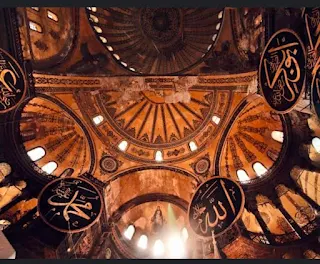Prophet Muhammad (570-632 CE) is the founder of Islam and is considered the last prophet in a line of prophets in Islamic tradition. His life and teachings form the foundation of the Islamic faith.
Early LifeBirth:
Muhammad was born in Mecca (in present-day Saudi Arabia) around 570 CE into the Hashim clan of the powerful Quraysh tribe.
Orphaned Early:
His father, Abdullah, died before he was born, and his mother, Amina, died when he was six years old. He was then raised by his grandfather, Abdul Muttalib, and later by his uncle, Abu Talib.Merchant Career: Muhammad became a merchant and was known for his honesty and trustworthiness, earning the nickname "Al-Amin" (the trustworthy). He worked for a wealthy widow, Khadijah, who later became his wife.
ProphethoodFirst Revelation:
At the age of 40, Muhammad began receiving revelations from Allah (God) through the angel Gabriel while meditating in the cave of Hira. The first revelation is considered to be the beginning of the Quran.
Public Preaching:
Muhammad started preaching monotheism, urging the people of Mecca to abandon idolatry and worship one God. This message faced strong opposition from the Quraysh leaders.
Persecution and HijraPersecution:
Muhammad and his followers faced severe persecution in Mecca. Some of his followers sought refuge in Abyssinia (modern-day Ethiopia).Hijra (Migration): In 622 CE, Muhammad and his followers migrated to Yathrib (later named Medina) in an event known as the Hijra. This migration marks the beginning of the Islamic calendar.
Life in MedinaEstablishment of the Muslim Community:
In Medina, Muhammad established a Muslim community based on Islamic principles and laws. He acted as both a spiritual and political leader.Conflicts with Mecca: There were several battles between the Muslims and the Meccans, including the Battle of Badr (624 CE), the Battle of Uhud (625 CE), and the Battle of the Trench (627 CE).
Conquest of MeccaTreaty of Hudaybiyyah:
In 628 CE, a peace treaty was signed between the Muslims and the Quraysh, which was later violated by the Quraysh.Conquest of Mecca: In 630 CE, Muhammad led a peaceful conquest of Mecca. The idols in the Kaaba were destroyed, and the city embraced Islam.
Final Years and DeathFarewell Pilgrimage:
In 632 CE, Muhammad performed his Farewell Pilgrimage and delivered his Farewell Sermon, emphasizing equality, justice, and the importance of following the Quran and his teachings.Death: Muhammad died on June 8, 632 CE, in Medina and was buried in the chamber of his wife Aisha, which is now part of the Prophet's Mosque.
LegacyQuran:
The Quran, considered the literal word of God, was revealed to Muhammad over 23 years and compiled into a single book after his death.
Hadith:
The sayings and actions of Muhammad, known as Hadith, provide further guidance on Islamic practice and law.
Influence:
Muhammad's teachings and the religion of Islam have had a profound impact on world history, culture, and society.Muhammad is revered by Muslims as the final prophet, and his life serves as a model of piety, leadership, and moral conduct.



No comments:
Post a Comment
fathimaj707@gmail.com